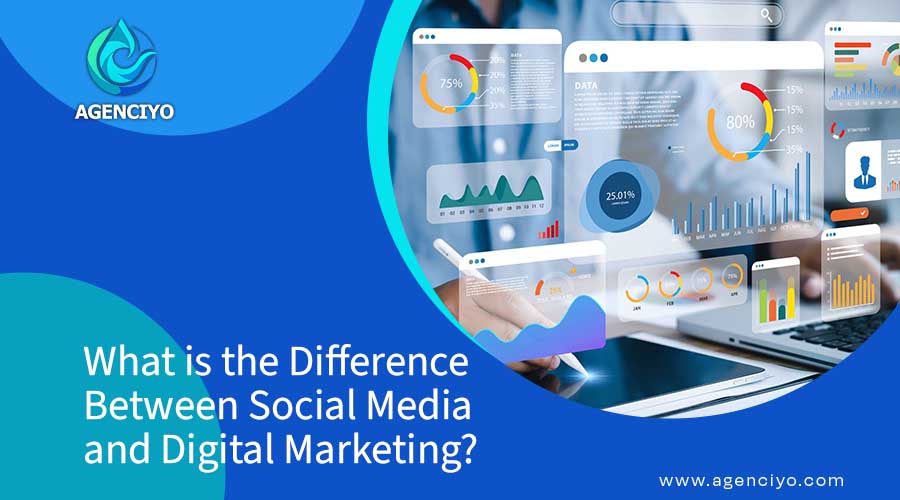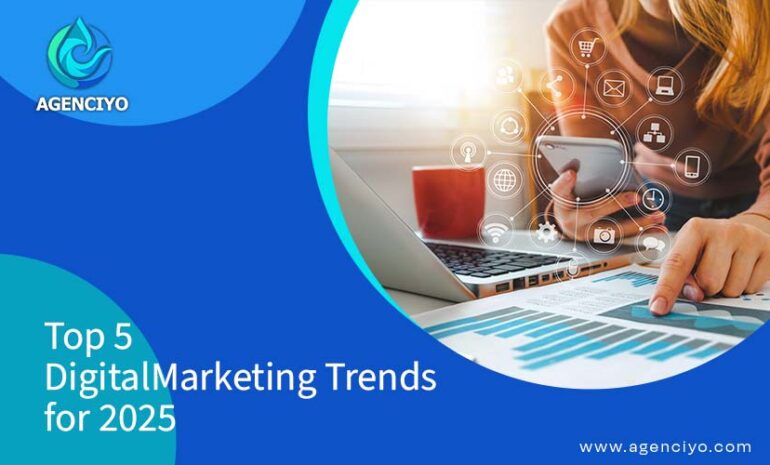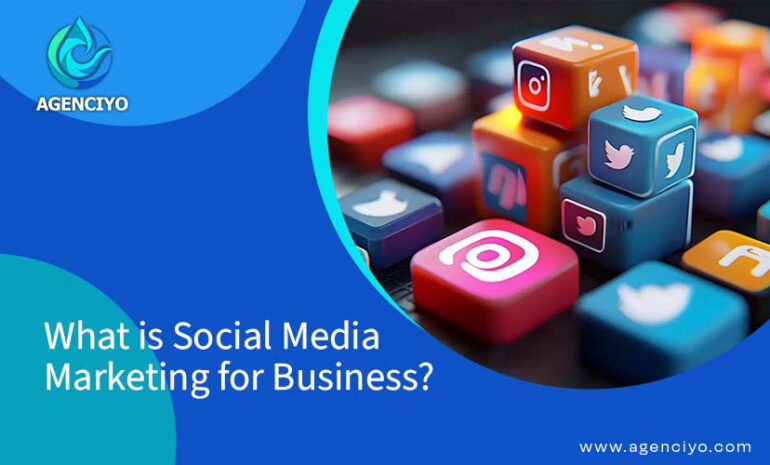In today’s internet age, two buzzwords are tossed around here. Social media marketing and digital marketing are frequently used interchangeably. They are closely related but not synonymous. Think of social media marketing as a component of the broader realm of digital marketing.
Knowing how they differ assists companies in making wiser marketing decisions. Selecting appropriate platforms and communicating with their target markets better. Let’s see with Agenciyo social media vs digital marketing.
What is digital marketing?
Digital marketing is a general term. That encompasses any type of marketing that occurs online. It’s all about leveraging the internet or electronic devices to reach potential customers. You May Also Read: What is Digital Marketing: The Ultimate Online Marketing Guide
Here you can see the difference between social media vs digital marketing:
Website Development and Management
Your website is your online storefront. A good website doesn’t just look good; it’s functional, fast, search engine optimized, and easy to use.
Search Engine Optimization (SEO)
Search Engine Optimization (SEO) is about getting your site to show up on Google. And also, on other search engines when people search for your business. It entails keyword research, technical optimization, and content enhancements.
Pay-Per-Click (PPC) Advertising
These are advertisements that appear on search engines or websites, where you pay only when someone clicks. Google Ads is the most popular platform for PPC campaigns.
Content Marketing
Producing useful content like blog posts, videos, infographics, etc. Attracts and engages your audience while making your brand an authority in your niche.
Email Marketing
Powerful digital marketing tools, like email marketing, assist you in staying connected with your audience via newsletters, offers, and product announcements.
Mobile Marketing
Smartphones are almost in every hand. Mobile marketing reaches users through SMS. Mobile apps, push notifications, and more reach people where they are, in the moment.
What is social media marketing?
Social media marketing is a niche field of digital marketing. It is exclusively dedicated to channels such as
- Facebook,
- Instagram,
- X (formerly Twitter),
- LinkedIn,
- TikTok,
- YouTube,
Some of the most important components of social media marketing are
Content Creation
Every platform has a different content type. Visuals for Instagram, short posts for X, videos for TikTok and YouTube, and professional content for LinkedIn.
Influencer Collaborations
Collaborating with influencers allows brands to leverage pre-existing audiences. And establish trust through genuine endorsements.
Community Engagement
Social media facilitates interaction. Engaging in comments, running polls, and responding to messages. It helps foster relationships and loyalty.
Social Media Advertising
This is the key difference between digital and social media marketing. Major platforms have strong ad tools. These let you target audiences based on location, interests, behavior, etc. Explore More: Social Media vs SEO: Which is Better for B2B Company?
Social Listening
This approach is really about listening to what’s being said about your brand online. And offline, stay on the pulse of trends, reviews, and feedback.
Key Differences Between social media vs digital marketing
Now that we’ve defined each one, let’s compare them side by side.
Scope
Digital marketing covers all online marketing efforts. Websites, SEO, PPC, email, mobile, and yes, social media.
Social media marketing focuses only on activities within social platforms.
Channels Used
Digital marketing uses a wide range of tools. Like websites, search engines, email campaigns, and display ads.
Social media marketing employs websites such as Facebook, Instagram, and LinkedIn.
Target Audience
Digital marketing can target individuals on the basis of their search patterns. It is based on browsing history or responses by email. Social media websites provide in-depth targeting. It is on the basis of users’ interests, actions, and demographics.
Tools Utilized
- Tools for Digital Marketing: Google Analytics, SEMrush, Google Ads, and Mailchimp.
- Social media marketing tools: Hootsuite, Buffer, Brandwatch, and Meta Ads Manager.
- Performance Indicators
Digital marketers gauge their success through indicators such as
- Conversion rate
- Click-through rate (CTR)
- Return on investment (ROI)
- Cost per acquisition (CPA)
Social media marketing is concerned with
- Likes, shares, and comments
- Engagement rate
- Reach and impressions
- Follower growth and social sentiment
How Do social media vs digital marketing Work Together?
Though they’re distinct, social media vs digital marketing aren’t rivals; they’re partners. When combined, they form a stronger, more comprehensive marketing strategy.
Boosting Content Reach
Blog or website content (digital marketing) can be promoted on social media to more people. You can repurpose an individual blog as Instagram carousels, Twitter threads, or TikTok clips.
Cross-Channel Campaigns
Advertisements on social media can lead customers to a product page. Or a landing page where digital marketing methods such as email capture intervene. Here we got the answer to what is social media vs digital marketing.
Customer Engagement
Social media facilitates real-time interaction. Whereas digital channels such as email and websites enable more intense engagement. It is through targeted content and promotions.
Cross-Promotion
Social media can be used to expand your email list. Drive website events or even drive app downloads. Mixing platforms to get the best results.
Conclusion
In short, digital marketing is the umbrella, and social media marketing is one of its strongest branches. Social media allows you to engage and interact with your audience in real time. Whereas digital marketing constructs your overall online presence. And generates measurable outcomes across channels.
Knowing how these two strategies are different gives you a better idea of how to construct a winning marketing game plan.
No matter if you are a businessperson, a marketing professional, or simply someone who is interested in the buzzwords that are buzzing around the net, this simplicity will guide you in the proper direction.


